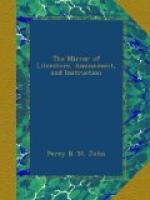got in; not so, however, with the Fairy Queen.
Beautiful it is indeed, most exquisitely and unapproachably
beautiful in many passages, especially about ladies
and ladies’ love more than celestial, for Venus
loses in comparison her lustre in the sky; but still
people were afraid to get into it then as now; and
“heavenly Una, with her milk-white lamb,”
lay buried in dust. As to Shakspeare, we cannot
find many traces of him in the domestic occupations
of the English gentry during the times alluded to;
nor do we believe that the character of Hamlet was
at all relished in their halls, though perhaps an
occasional squire chuckled at the humours of Sir John
Falstaff. We have Mr. Wordsworth’s authority
for believing that Paradise Lost was a dead letter,
and John Milton virtually anonymous. We need say
no more. Books like these, huge heavy vols. lay
with other lumber in the garrets and libraries.
As yet, Periodical Literature was not; and the art
of printing seems long to have preceded the art of
reading. It did not occur to those generations
that books were intended to be read by people in general,
but only by the select few. Whereas now, reading
is not only one of the luxuries, but absolutely one
of the necessaries of life, and we now no more think
of going without our book than without our breakfast;
lunch consists now of veal-pies and Venetian Bracelets—we
still dine on Roast-beef, but with it, instead of
Yorkshire pudding, a Scotch novel—Thomas
Campbell and Thomas Moore sweeten tea for us—and
in “Course of Time” we sup on a Welsh rabbit
and a Religious Poem.
We have not time—how can we?—to
trace the history of the great revolution. But
a great revolution there has been, from nobody’s
reading anything, to every body’s reading all
things; and perhaps it began with that good old proser
Richardson, the father of Pamela, Clarissa, and Sir
Charles Grandison. He seems to have been a sort
of idiot, who had a strange insight into some parts
of human nature, and a tolerable acquaintance with
most parts of speech. He set the public a-reading,
and Fielding and Smollett shoved her on—till
the Minerva Press took her in hand—and
then—the Periodicals. But such Periodicals!
The Gentleman’s Magazine—God bless
it then, now, and for ever!—the Monthly
Review, the Critical and the British Critic!
The age had been for some years literary, and was
now fast becoming periodical. Magazines multiplied.
Arose in glory the Edinburgh, and then the Quarterly
Review—Maga, like a new sun, looked out
from heaven—from her golden urn a hundred
satellites drew light—and last of all, “the
Planetary Five,” the Annuals, hung their lamps
on high; other similar luminous bodies emerged from
the clouds, till the whole circumference was bespangled,
and astronomy became the favourite study with all
ranks of people, from the King upon the throne to
the meanest of his subjects. Now, will any one
presume to deny, that this has been a great change
to the better, and that there is now something worth




